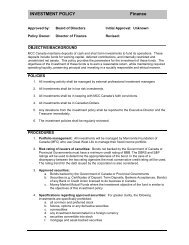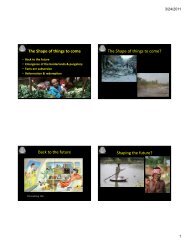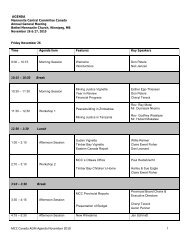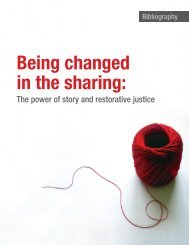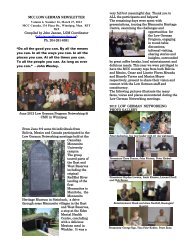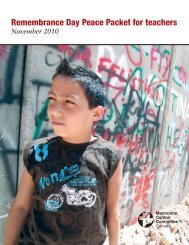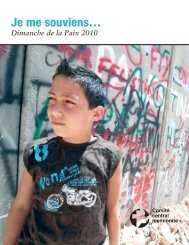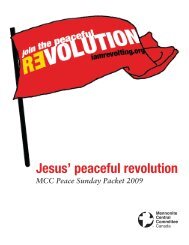Walking together: Healing and hope for Colombian refugees
Walking together: Healing and hope for Colombian refugees
Walking together: Healing and hope for Colombian refugees
You also want an ePaper? Increase the reach of your titles
YUMPU automatically turns print PDFs into web optimized ePapers that Google loves.
w a l k i n g<br />
t o g e t h e r<br />
19<br />
of people living in absolute poverty <strong>and</strong> the deep socio-economic inequalities than with the armed<br />
groups themselves. Violence does not just come out of the barrel of a gun; it is also fuelled by the<br />
suffering of those who live in miserable conditions. Desperate people use violence as a means to seek<br />
change <strong>and</strong> the poor can view membership in an armed group as a source of employment or power.<br />
At the same time, violence also aggravates the inequalities. Particular economic groups, drug cartels<br />
<strong>and</strong> large l<strong>and</strong>-owners created private armies in Colombia to protect their interests <strong>and</strong> to exp<strong>and</strong> their<br />
monopoly over economic resources. Several studies have shown the connection between AUC presence<br />
<strong>and</strong> the concentration of property, drug trafficking <strong>and</strong> a consolidation of economic mega-projects<br />
that violate the interests of the local population. The Consulting Office <strong>for</strong> Human Rights <strong>and</strong> Forced<br />
Displacement – CODHES – estimates that the AUC <strong>and</strong> the drug cartels took approximately 5 million<br />
hectares of l<strong>and</strong> by <strong>for</strong>ce between 1997-2003.<br />
Political Control: Alongside the economic interests that motivate the creation of private armies,<br />
the dominant political leaders’ desire to maintain power <strong>and</strong> repress minority opposition groups has<br />
strengthened these armed actors. Selective assassinations <strong>and</strong> disappearances committed by the<br />
paramilitaries weaken alternative political groups <strong>and</strong> maintain the power imbalance weighted towards the<br />
traditional political-economic elite, thus breaking down the public democratic process. During the second<br />
semester of 2006 the Supreme Court of Justice began to process dozens of cases of congressional<br />
members, government functionaries <strong>and</strong> regional politicians accused of maintaining alliances with the<br />
AUC, thus highlighting a historic reality that the media suddenly sc<strong>and</strong>alized as “para-politics.” In regions<br />
where the insurgent groups have gained control, similar patterns arise. The FARC <strong>and</strong> the ELN use threats<br />
<strong>and</strong> assassinations to maintain their influence over local <strong>and</strong> regional governments.<br />
The Role of the State: Overall, the State has not maintained a permanent presence in much of<br />
Colombia’s territory <strong>and</strong> there<strong>for</strong>e illegal armed groups (guerrilla <strong>and</strong> paramilitary groups) have filled<br />
these gaps. In addition, with regards to the private armies propagated by powerful elite, the State has<br />
often turned a blind eye rather than seeking to regain monopoly over the use of <strong>for</strong>ce. The state has not<br />
functioned as an impartial entity protecting the common good, but rather has allowed certain groups to<br />
use private armed actors to impose their interests. Moreover, human rights organizations have extensively<br />
documented the collaboration between State Armed Forces <strong>and</strong> the private defence groups.<br />
Psychological Factors – individual <strong>and</strong> collective trauma: Personal psychological elements have<br />
also played a significant role in the growth of armed groups. The FARC initiated in response to the<br />
<strong>Colombian</strong> State bombing of an “autonomous civilian commune” in 1964. Decades later FARC leaders<br />
point back to the losses suffered then as the instigation <strong>for</strong> their war. The principle leaders of the AUC,<br />
as well as many of their combatants, all suffered insurgent attacks on their family members. As the<br />
different armed groups absorb this chosen trauma into their identity, they feel entitled, as victims, to<br />
always act with reference to the initial violation against them. The desire <strong>for</strong> revenge <strong>and</strong> fear of future<br />
attacks generates a psychological framework that supports systematic violence against a profoundly<br />
“bad” enemy. In a context of around 98% impunity, the armed groups easily convince themselves that<br />
they are acting in favour of justice by eliminating the other groups. This deep sense of “righteousness”



